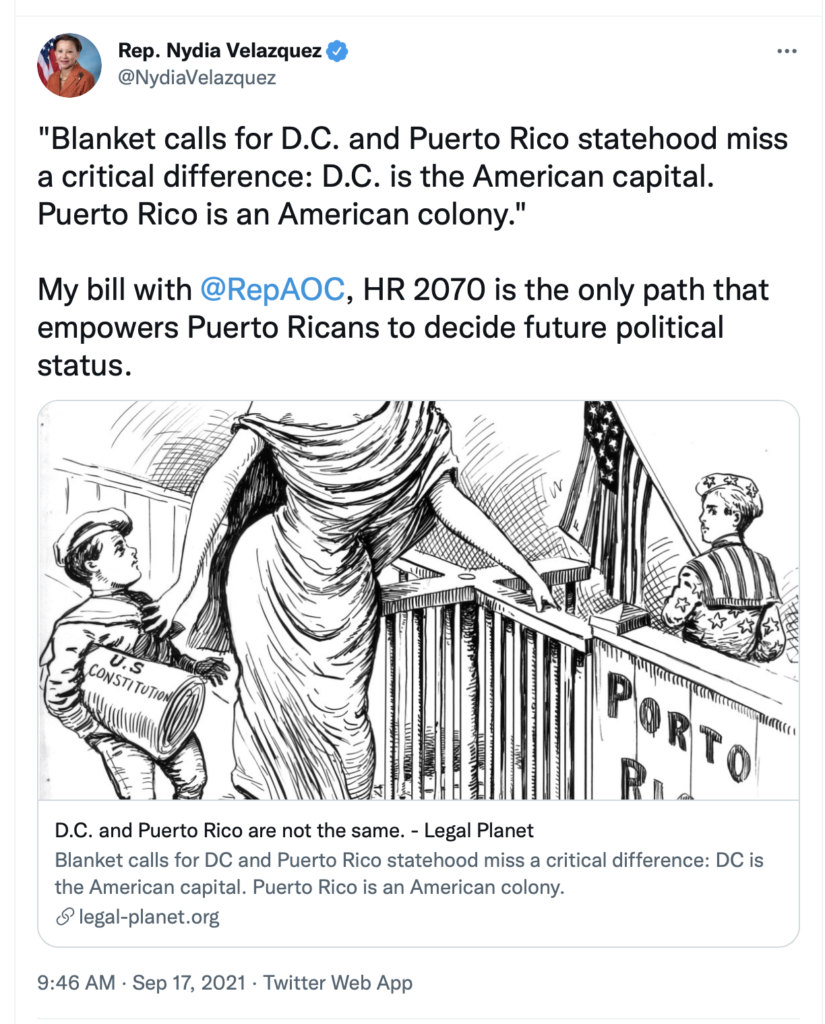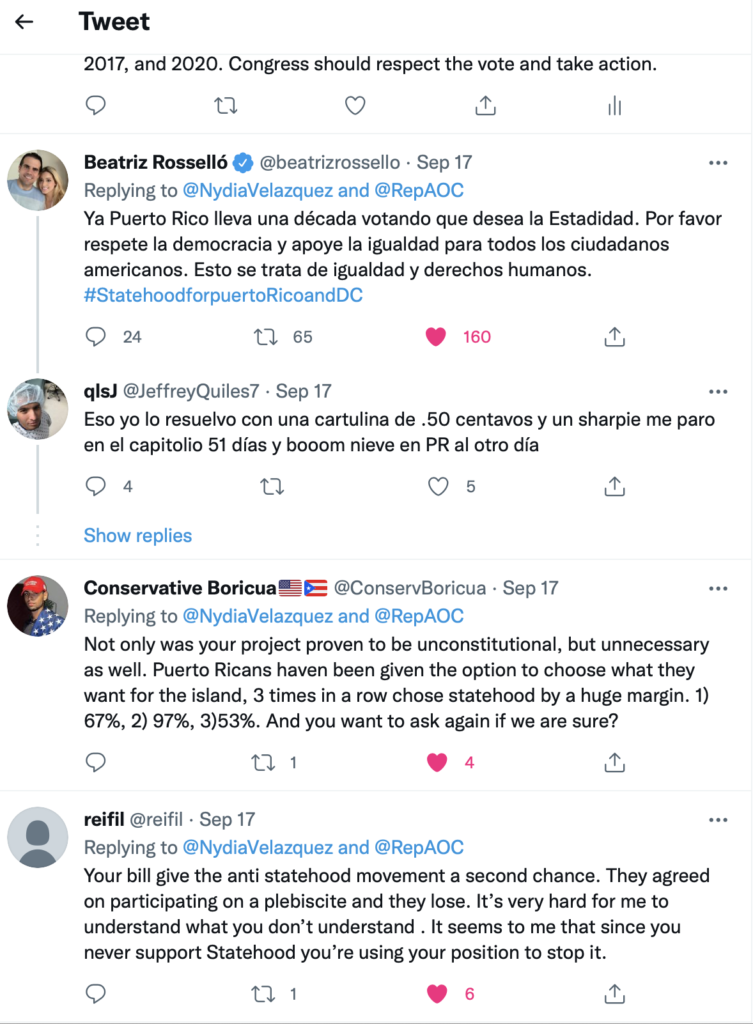The Natural Resources Committee will discuss both HR 1522 and HR 2070 this season. While there have been suggestions that the two could be combined in a compromise bill, supporters of both bills continue to work for them.
Rep.Nydia Velazquez tweeted about her bill, HR 2070:

It is true that the cases of Washington, D.C., and Puerto Rico are not the same. As a territory, Puerto Rican easily be made a state with a simple majority vote in Congress.
But it is not true, as Velazquez claims, that “HR 2070 is the only path that empowers Puerto Ricans to decide future political status.”
Puerto Rico has already traveled most of the way along the path that has brought 32 other territories to statehood. Puerto Rico has held a referendum, which statehood won (again). The official representative of Puerto Rico in Congress has introduced a statehood bill (HR 1522). Congress should respect Puerto Rico’s vote and admit Puerto Rico as a state.
This is what respondents to Velazquez’s tweets said:

“Not only was your project proven to be unconstitutional,”wrote Conservative Boricua, “but unnecessary as well. Puerto Ricans have been given the option to choose what they want for the island, 3 times in a row chose statehood by a huge margin. 1) 67%, 2)97%, 3)53%. And you want toast again if we are sure?”
“Your bill gave the anti statehood movement a second chance,” said Reifil. “They agreed on participating in a plebiscite and they lost. It’s very hard for me to understand what you don’t understand. It seems to me that since you never support Statehood you’re using your position to stop it.”
It’s clear that people who have the benefits of statehood are creating obstacles for those who don’t have those benefits.
But in addition, there are real problems with HR 2070. It looks though its primary goal is to delay statehood, but it also has some very strange elements beyond that.
Serious Problems with Velazquez & Ocasio-Cortez “Self-Determination” Bill
Some specifics
The bill establishes a “semipermanent body” of elected delegates to a constitutional convention. The delegates will be elected, but there must be at least one delegate for every proposed status option. So, if no candidate for “enhanced commonwealth” is elected, one will presumably have to be appointed.
In the course of their campaigns for election, the delegates will have federal funding. However, in order to get that funding, they will have to follow these rules:
(A) agree to increased financial oversight from the Federal Election Commission;
(B) limit campaign spending to not more than $25,000; and
(C) demonstrate a basic level of support from residents of Puerto Rico by receiving from residents of Puerto Rico not fewer than 50 donations from 50 individuals of not more than $50.
Imagine placing these restrictions on campaigns in a state. It would not happen.
These delegates, once elected on a semi-permanent basis, will “debate and draft definitions on self-determination options for Puerto Rico, which shall be outside the Territorial Clause of the United States Constitution.” The Justice Department has said, over and over, that the only options outside the territorial clause are statehood and independent nationhood.
Then there will be a committee from the U.S. Congress to advise the delegates. Some of the members of this committee must “represent a State or district in a State that, as determined by the most recently publicly available data from the Bureau of the Census, represents one of the 10 States with the largest population of people who identified on the most recent Census as Puerto Rican.” The object here must be to make sure that people who do not live in Puerto Rico nonetheless have influence over Puerto Rico.
Velazquez has repeatedly attempted to give Puerto Ricans living in the states a vote on the Island’s political status. Do people whose grandparents hail from Idaho, but who currently live in Georgia, get any say in the decisions made by Idaho? You know they don’t.
These people will “develop recommendations regarding self-determination options on constitutional issues and policies related to—
(i) culture;
(ii) language;
(iii) judicial and public education systems;
(iv) taxes; and
(v) United States citizenship”
In what way will these members of Congress make recommendations on the culture of Puerto Rico? And when they finish with Puerto Rico, can they do the same for Maine or Hawaii?
The delegates must send annual reports to Congress. Annual reports. From a semipermanent body. Clearly, the plan is for this process to take years.
Should a referendum eventually take place, the method of voting will be complex. The winning option will then be presented to Congress, where once again the voting will include many complicated extra rules. If Congress doesn’t approve the choice of the people, then the delegates can try again.
Read the full text of the bill and you will see that there is no exaggeration here. Please ask your congressional representative to support HR 1522.







No responses yet